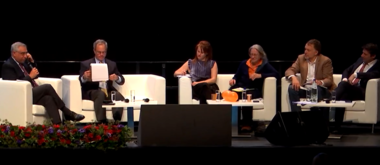Breaking the web
-thumb-370x394-716.jpg) So here we are, more than 20 years after Tim Berners-Lee invented the web, and we're still having to explain to people who ought to know better that the whole point of the web is to be able to link to things as part of a free and open discussion. Berners-Lee has stressed many times the crucial importance of his decision not to patent the web, so that linking requires no license or payment. By now you'd have thought that almost everyone would be familiar enough with the web to understand this.
So here we are, more than 20 years after Tim Berners-Lee invented the web, and we're still having to explain to people who ought to know better that the whole point of the web is to be able to link to things as part of a free and open discussion. Berners-Lee has stressed many times the crucial importance of his decision not to patent the web, so that linking requires no license or payment. By now you'd have thought that almost everyone would be familiar enough with the web to understand this.
And yet....they keep trying. Last week, the Electronic Frontier Foundation highlighted the US court case Goldman v. Breitbart, in which a federal judge decided that embedding a tweet can be copyright infringement. A tweet is not a link - but in EFF's analysis following the logic of the judge's opinion leads to its encompassing all inline linking, not just embedding tweets. If other courts adopt this ruling, which up-ends existing case law...basically, we'd be talking link licensing and fees and the web becomes an impossibility.
Meanwhile, Glyn Moody has been warning that in the EU, publishers are backing a proposal to extend copyright law to include article snippets. In the US, that would presumably be covered by fair use the French and German press agencies want copyright extended to hyperlinks as well. I understand the many reasons to complain that Google and Facebook are scooping up all the revenues publishers think is theirs by right, but how much traffic do they imagine they'll have if no one links to their work?
Collapsing traffic is, as Moody points out, is what happened when Belgium, Spain, and Germany tried it: having demanded control over Google's linking, Belgian publishers then complained when Google dumped Belgian media from Google News; German publishers wound up giving Google a free license; and a study of the Spanish system found it caused serious economic damage to both Spanish media and innovation in general. We have some evidence that this time would be no different: independent news outlets in countries from Guatemala to Slovakia have complained about the crash in their traffic since Facebook changed its newsfeed to emphasize personal news rather than professional media.
Taxing links is, sadly, not a new idea in either the US or the EU. When net.wars first wrote about demands to control linking in 2002, we noted Kraft Foods' 1996 effort to require anyone linking to its website to obtain a "link license".
But note: it was Kraft Foods complaining. In 1996 there were no internet companies of a size comparable to the publishing conglomerates or telecommunications companies. Apple was cratering under 500-day CEO Gil Amelio and a year away from rehiring Steve Jobs, Amazon was growing fast but was years away from breaking even, Larry Page and Sergey Brin were in a dorm room working on the early stages of Backrub, the first prototype of what became Google's PageRank, and Mark Zuckerberg was 12 years old. The damage Kraft worried about less about copyright than about the reputational damage they imagined they would suffer if internet posters made fun of them.
The best hope for the US situation is an appeal that reverses the ruling and applies the standard established by the earlier case, Perfect 10 v. Amazon, which held that displaying thumbnail images with links was fair use. The EU situation is more complicated.
 First of all, when we last visited the subject, in 2016, links were the subject of a court case in which the judge ruled that commercial sites should be presumed to know when the material they link to infringes copyright. As the German Pirate Party MEP Julia Reda has said, the EU's history of wanting to impose a "link tax" goes back many years; she recounts the most recent effort with distaste.
First of all, when we last visited the subject, in 2016, links were the subject of a court case in which the judge ruled that commercial sites should be presumed to know when the material they link to infringes copyright. As the German Pirate Party MEP Julia Reda has said, the EU's history of wanting to impose a "link tax" goes back many years; she recounts the most recent effort with distaste.
Second of all, besides Article 11, in which the offending link proposals appear, other parts of the proposed copyright directive are actually worse. Moody has also been sounding the alarm about the damage the proposed Article 13 would inflict: it would require sites to implement general upload filters to ensure infringing material never gets posted to the internet. In analyzing it, European Digital Rights argues that it would make all web hosting services directly liable for everything users post (PDF) and up-end previously agreed exceptions such as parody and quotation. In a joint open letter, the Center for Democracy and Technology calls it a dramatic erosion of the liability protections in the e-Commerce Directive and would damage free speech. It's hard to see how it meets the European Commission's stated desire to modernise copyright rules.
The one piece of good news in all this is that Intellectual Property Watch reports that negotiations over the directive between the European Presidency and the European Parliament are so contentious that there is "no clear end in sight to the negotiations". While they're bickering, it appears that the European Court of Justice will be deciding whether the taste of cheese spread can be copyrighted.
Illustrations: Public and Private Life of Animals (1877, via Public Domain Review; Julia Reda.
Wendy M. Grossman is the 2013 winner of the Enigma Award. Her Web site has an extensive archive of her books, articles, and music, and an archive of earlier columns in this series. Stories about the border wars between cyberspace and real life are posted occasionally during the week at the net.wars Pinboard - or follow on Twitter.

 There's a certain irony about the fact that John Perry Barlow, who styled himself "cognitive dissident" and whose early 1990s writings set the tone of so much discourse about the internet and inspired so many thousands of activists, has died in the same week that Conde Nast has
There's a certain irony about the fact that John Perry Barlow, who styled himself "cognitive dissident" and whose early 1990s writings set the tone of so much discourse about the internet and inspired so many thousands of activists, has died in the same week that Conde Nast has 
 In his draft paper, Swire favors allowing greater surveillance of non-citizens than citizens. While some countries - he cited the US and Germany - provide greater protection from surveillance to their own citizens than to foreigners, there is little discussion about why that's justified. In the US, he traces the distinction to Watergate, when Nixon's henchmen were caught unacceptably snooping on the opposition political party. "We should have very strong protections in a democracy against surveilling the political opposition and against surveilling the free press." But granting everyone else the same protection, he said, is unsustainble politically and incorrect as a matter of law and philosophy.
In his draft paper, Swire favors allowing greater surveillance of non-citizens than citizens. While some countries - he cited the US and Germany - provide greater protection from surveillance to their own citizens than to foreigners, there is little discussion about why that's justified. In the US, he traces the distinction to Watergate, when Nixon's henchmen were caught unacceptably snooping on the opposition political party. "We should have very strong protections in a democracy against surveilling the political opposition and against surveilling the free press." But granting everyone else the same protection, he said, is unsustainble politically and incorrect as a matter of law and philosophy.